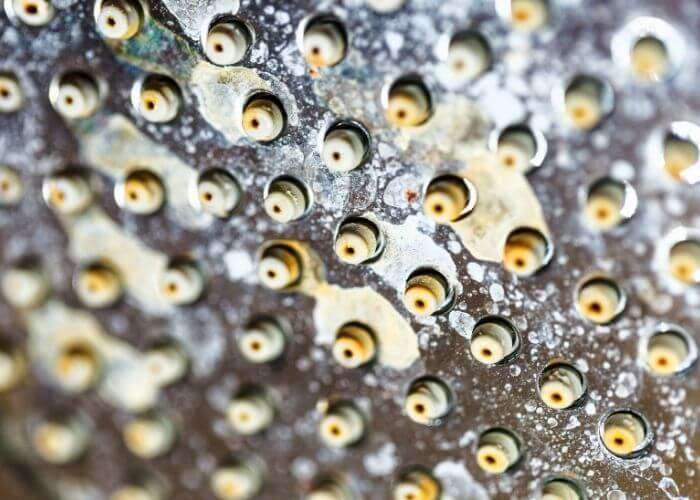Hard Water and Soft Water [2022] | Which One is Healthier?
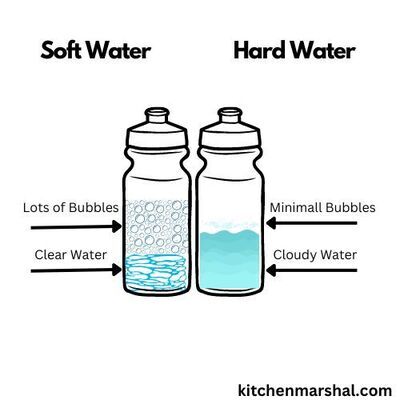
Hard Water and Soft Water | Which One is Healthier?
Curious to know the type of water you are getting from the tap of your house? Well, first, you need to understand the differences between hard water and soft water.
As stated by the US Geological Survey, 85 percent of United States water is hard water. That means there is an 85 percent chance of getting hard water in your house.
13 grains per gallon is the average hardness level in the United States of America and the People of Arizona have the hardest water. Is it safe for your family?
Don’t worry; we’ll provide you with detailed information about hard water vs soft water to assist you to know which of the two is best to have at your home.
Infographic of Hard Water and Soft Water
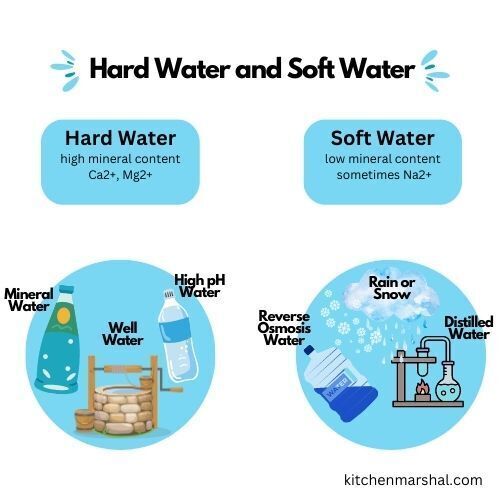
What Is Hard Water?
It has a high concentration of dissolved minerals…
Well, hard water is technically water with a high concentration of dissolved minerals or dissolved bicarbonate minerals – calcium bicarbonate and magnesium bicarbonate.
The water hardness depends on a location and its level of mineral composition.
Some areas can have water that’s harder than others, depending on the level of minerals.
How does water become hard water?
Well, water dissolves these minerals when it flows through deposits of calcium and magnesium; this is how water turns to hard water.
On to the next point, most people wonder if hard water is good for one’s health; well, it has moderate health advantages.
Nonetheless, in industrial and domestic settings, hard water may not be the best solution.
What is Soft Water?
Low concentration of dissolved minerals…
Soft water can occur naturally; however, hard water can be treated to become soft water. Except, what is soft water? In simple terms, it’s water that has a low concentration of dissolved minerals.
You can access soft water through rainwater and water percolated through hard rocks like sodium or granite. You can say, surface water softer instead of groundwater.
In some cases, the softened water might also consist of elevated bicarbonate ions and even sodium levels.
Turning hard water into soft water…
Soft water can have a salty taste as a result of sodium; furthermore, to access soft water in your homes, you can opt for a water softener; these items are capable of turning hard water into soft water.
Soft water is more recommended for household settings because it doesn’t do more harm than good.
The Comparison: Hard Water Vs Soft Water
How about we compare hard water vs soft water to understand the differences in detail.
Hard Water
Is rainwater hard or soft?
Well, rainwater is soft water; it only consists of de-ionized sodium, which can be natural or water treatment.
Rainfall having liquefied carbon dioxide can respond with calcium carbonate and also carry calcium ions away with it.
Love to consume hard water…
However, it dissolves calcium, magnesium carbonates, chalk, and lime creating hard water when it flows through the ground.
Numerous individuals love to consume hard water due to its high mineral content composition.
The drinking waters’ taste differs too; soft water has a salty taste. For this, most people choose hard water over soft water.
Hard water’s worst drawback…
The most evident difference between hard water and soft water can be observed while doing household chores.
Hard water leaves stains on dishes, clothes, pipes, bathtub, and most utensils, soft water doesn’t.
Hard water’s worst drawback is mineral buildup, which causes use more energy to increase your bills. Machines with scale buildup need more energy to work efficiently.
For instance, the limescale can ruin your pipes hence making you purchase new ones.
It also needs more soap compared to soft water; hard water damages hair by working as a barrier to moisturizers and conditioners, and so on.
Advantages of Hard Water
| 1. Hard water has essential minerals that are great for one’s health and effective if drunk daily. |
| 2. Speculation that hard water is capable of preventing heart disease and fighting off cardiovascular diseases is advantageous. |
| 3. Its taste is better off than soft water, which, due to its sodium composition, tastes salty. |
| 4. It’s suitable for daily consumption. |
Disadvantages of Hard Water
| 1. It leaves stains on utensils, pipes, bathtubs, and various home appliances. |
| 2. It leaves clothes looking dull. |
| 3. It causes dry skin. |
| 4. It’s capable of increasing eczema, especially within children. |
| 5. It damages hair. |
| 6. It shortens the lifespan of home appliances, making you replace them after a short while. |
| 7.It causes scale build-up inside a water supply pipe. |
| 8. It builds Limescale, which narrows down the space of your shower head. |
| 9. It deposits calcium carbonated during heated. |
Soft Water
Soft water a savior…
Hard water can be a headache for individuals who need to do chores. However, on the other hand, soft water is a savior when it comes to doing chores.
This is why most people who need to do household chores prefer soft water; this is essential soft water advantages.
Additionally, soft water does an excellent job for the skin, unlike hard water.
Lesser calcium ions…
Because soft water has lesser calcium ions, no soap scum is developed during routine cleaning.
Furthermore, suppose you opt for soft water when it comes to cleaning utensils, dishwashers, water heaters, etc. In that case, you opt for a prolonged lifespan for your appliances.
Suppose you choose to utilize soft water instead of hard water. In that case, you’ll come to notice that your bills will significantly reduce.
As we have covered soft water benefits, let’s dig deeper into soft water problems and illustrated both pros and cons of soft water.
The question is softened water safe to drink without any side effects? Can you drink water from a water softener?
The answer is no; this is why; it’s not advisable for individuals with heart disease and a diet that entails low sodium intake.
When hard water is softened, the minerals are omitted; however, sodium is added. Besides, numerous professionals warn that soft water can be harmful if it’s consumed daily.
During the process of water softening…
That’s because individuals who consume soft water every day have high sodium levels. As much as sodium is a crucial part of the everyday diet, it can be harmful if consumed in large quantities.
Lastly, during the process of water softening, various chemicals are added to the water. As a result, the water is capable of adding unwanted metals such as lead. These metals can harm your health.
For pure drinking water supply don’t forget to check my article on Best Bottom Loading Water Dispenser here.
Advantages of Soft Water
| 1. Dishes become clean with no stains. |
| 2. Prolonged lifespan of household appliances such as washing machines, dishwashers, coffee pot, etc. |
| 3. It helps get hydrated and healthy skin. |
| 4. You’ll have to pay significantly low bills. |
| 5. No limescale buildup |
Disadvantages of Soft Water
| 1. This water isn’t advisable for daily consumption. |
| 2. It’s able to originate from health problems. |
| 3. Not suitable for high blood pressure patients. |
Hard Water and Soft Water: The Differences
As much as we have covered the differences between hard water vs soft water, we ought to dig deeper into the primary differences between soft vs hard water. Without further ado, let’s dive in;
Mineral Content
Hard water provides lots of health benefits…
This is the primary difference between hard vs soft water, as we elaborated in detail earlier.
Rain, when it falls its soft water. However, when it falls on the ground and picks up minerals such as magnesium and calcium, it becomes hard water.
Soft water, on the other hand, doesn’t consist of all those minerals.
Drinking-Water
The mineral structure of hard water provides lots of health benefits for your heart and bones – calcium aids protect against osteoporosis.
Drinking it is not one of them…
Since soft water doesn’t consist of minerals as hard water does, it’s not advisable for human consumption.
It has various advantages but drinking it is not one of them; this is because it’s known to be harmful to human health.
For smart drinking water solution don’t forget to read my article on Best Countertop Water Dispenser here.
Household Chores
Hard tap water is frustrating …
When it comes to chores, soft tap water instantly takes the crown; soft water can clean household appliances without leaving stains or spots, unlike hard water.
Hard tap water is frustrating because of soap scum; soap scum results from a reaction between hard water’s calcium and regular soap.
To avoid this scum, you have to opt for soft water.
Hard water leaves spots on dishes, makes clothes look dingy, needs way more soap to get your items cleaned. It’s not advisable for household chores, unlike soft water.
Skin
Skin looks and feels soft…
Hard water is a total nightmare to use while doing your skincare routine because it leaves your skin feeling and dry.
However, soft water leaves your skin looking and feeling soft. Hard water is a problem for sensitive skin, especially for the scalp.
Hard water is caused by calcium and magnesium buildup as well as other hard metal buildup in the water, and that causes damage to the skin because they’re metals, says Ming Zhao, co-founder and CEO of Proven skin care which uses artificial intelligence to customize your skin routine.
“This dries out the skin and causes it to lose luster, and has bad long-term effects on your complexion.”
In technical terms, “minerals deposit on the skin, disrupt proper function of the outer skin layer, and lead to irritation and inflammation,”
explains Joshua Zeichner, MD, a New York-based dermatologist.
Mineral Buildup
May form a mess…
Mineral buildup is possibly the most significant downside of hard water.
As the term recommends, the Mineral buildup is the buildup of minerals brought in the water on surface areas; the water relocates via or touche.
Moreover, mineral deposits caused by mineral buildups may form a mess on your shower head and appliances.
Typical locations where you will undoubtedly see mineral buildup remain in pipelines, tools, chrome, floor tile, fiberglass, and glass.
Grains per Gallon
Water Hardness…
Below are the limits for the water hardness, broken down by the variety of Grains Per Gallon located in the water: <1 GPG of hardness is thought about soft water.
1-7 GPG of hardness is believed to about reasonably hard. 7-10 GPG of hardness is believed to about hard.
Calcium Carbonate
Calcium carbonate is categorized as soft…
General standards for the category of waters are: 0 to 60 mg/L (milligrams per liter) as calcium carbonate is categorized as soft; 61 to 120 mg/L as reasonably hard; 121 to 180 mg/L as hard; and greater than 180 mg/L as extremely hard.
Water hardness in the United States of America means hardness as calcium carbonate at NASQAN water-monitoring websites throughout the 1975 water year.
Your Attractive Heading
Curious to know the type of water you are getting from the tap of your house? Well, first, you need to understand the differences between hard water and soft water.
As stated by the US Geological Survey, 85 percent of United States water is hard water. That means there is an 85 percent chance of getting hard water in your house.
13 grains per gallon is the average hardness level in the United States of America and the People of Arizona have the hardest water. Is it safe for your family?
Don’t worry; we’ll provide you with detailed information about hard water vs soft water to assist you to know which of the two is best to have at your home.
Hard Water and Soft Water
What Is Hard Water?
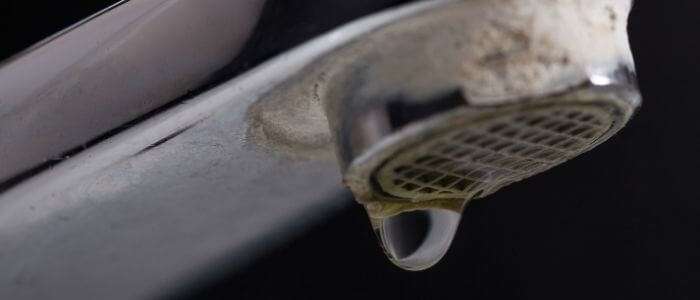
It has a high concentration of dissolved minerals…
Well, hard water is technically water with a high concentration of dissolved minerals or dissolved bicarbonate minerals – calcium bicarbonate and magnesium bicarbonate.
The water hardness depends on a location and its level of mineral composition.
Some areas can have water that’s harder than others, depending on the level of minerals.
How does water become hard water?
Well, water dissolves these minerals when it flows through deposits of calcium and magnesium; this is how water turns to hard water.
On to the next point, most people wonder if hard water is good for one’s health; well, it has moderate health advantages.
Nonetheless, in industrial and domestic settings, hard water may not be the best solution.
What is Soft Water?

Low concentration of dissolved minerals…
Soft water can occur naturally; however, hard water can be treated to become soft water. Except, what is soft water? In simple terms, it’s water that has a low concentration of dissolved minerals.
You can access soft water through rainwater and water percolated through hard rocks like sodium or granite. You can say, surface water softer instead of groundwater.
In some cases, the softened water might also consist of elevated bicarbonate ions and even sodium levels.
Turning hard water into soft water…
Soft water can have a salty taste as a result of sodium; furthermore, to access soft water in your homes, you can opt for a water softener; these items are capable of turning hard water into soft water.
Soft water is more recommended for household settings because it doesn’t do more harm than good.
Hard Water vs. Soft Water
How about we compare hard water vs soft water to understand the differences in detail.
Hard Water
Is rainwater hard or soft?
Well, rainwater is soft water; it only consists of de-ionized sodium, which can be natural or water treatment.
Rainfall having liquefied carbon dioxide can respond with calcium carbonate and also carry calcium ions away with it.
Love to consume hard water…
However, it dissolves calcium, magnesium carbonates, chalk, and lime creating hard water when it flows through the ground.
Numerous individuals love to consume hard water due to its high mineral content composition.
The drinking waters’ taste differs too; soft water has a salty taste. For this, most people choose hard water over soft water.
Hard water’s worst drawback…
The most evident difference between hard water and soft water can be observed while doing household chores.
Hard water leaves stains on dishes, clothes, pipes, bathtub, and most utensils, soft water doesn’t.
Hard water’s worst drawback is mineral buildup, which causes use more energy to increase your bills. Machines with scale buildup need more energy to work efficiently.
For instance, the limescale can ruin your pipes hence making you purchase new ones.
It also needs more soap compared to soft water; hard water damages hair by working as a barrier to moisturizers and conditioners, and so on.
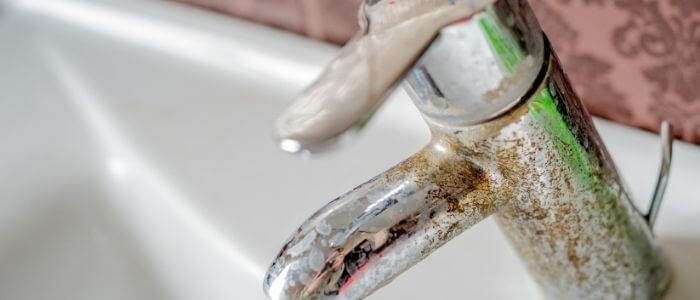
Advantages of Hard Water
| SL No. | Description |
|---|---|
| 1 | Hard water has essential minerals that are great for one’s health and effective if drunk daily. |
| 2 | Speculation that hard water is capable of preventing heart disease and fighting off cardiovascular diseases is advantageous. |
| 3 | Its taste is better off than soft water, which, due to its sodium composition, tastes salty. |
| 4 | It’s suitable for daily consumption. |
Disadvantages of Hard Water
| SL No. | Disadvantages |
|---|---|
| 1 | It leaves stains on utensils, pipes, bathtubs, and various home appliances. |
| 2 | It leaves clothes looking dull. |
| 3 | It causes dry skin. |
| 4 | It’s capable of increasing eczema, especially within children. |
| 5 | It damages hair. |
| 6 | It shortens the lifespan of home appliances, making you replace them after a short while. |
| 7 | It causes scale build-up inside a water supply pipe. |
| 8 | It builds Limescale, which narrows down the space of your shower head. |
| 9 | It deposits calcium carbonated during heated. |
Soft Water
Soft water a savior…
Hard water can be a headache for individuals who need to do chores. However, on the other hand, soft water is a savior when it comes to doing chores.
This is why most people who need to do household chores prefer soft water; this is essential soft water advantages.
Additionally, soft water does an excellent job for the skin, unlike hard water.
Lesser calcium ions…
Because soft water has lesser calcium ions, no soap scum is developed during routine cleaning.
Furthermore, suppose you opt for soft water when it comes to cleaning utensils, dishwashers, water heaters, etc. In that case, you opt for a prolonged lifespan for your appliances.
Suppose you choose to utilize soft water instead of hard water. In that case, you’ll come to notice that your bills will significantly reduce.
As we have covered soft water benefits, let’s dig deeper into soft water problems and illustrated both pros and cons of soft water.
The question is softened water safe to drink without any side effects? Can you drink water from a water softener?
The answer is no; this is why; it’s not advisable for individuals with heart disease and a diet that entails low sodium intake.
When hard water is softened, the minerals are omitted; however, sodium is added. Besides, numerous professionals warn that soft water can be harmful if it’s consumed daily.
During the process of water softening…
That’s because individuals who consume soft water every day have high sodium levels. As much as sodium is a crucial part of the everyday diet, it can be harmful if consumed in large quantities.
Lastly, during the process of water softening, various chemicals are added to the water. As a result, the water is capable of adding unwanted metals such as lead. These metals can harm your health.
For pure drinking water supply don’t forget to check my article on Best Bottom Loading Water Dispenser here.

Advantages of Soft Water
| Sl No. | Advantages |
|---|---|
| 1 | Dishes become clean with no stains. |
| 2 | Prolonged lifespan of household appliances such as washing machines, dishwashers, coffee pot, etc. |
| 3 | It helps get hydrated and healthy skin. |
| 4 | You’ll have to pay significantly low bills. |
| 5 | No limescale buildup |
Disadvantages of Soft Water
| SL No. | Disadvanges |
|---|---|
| 1 | This water isn’t advisable for daily consumption. |
| 2 | It’s able to originate from health problems. |
| 3 | Not suitable for high blood pressure patients. |
Main Differences between Hard and Soft Water
As much as we have covered the differences between hard water vs soft water, we ought to dig deeper into the primary differences between soft vs hard water. Without further ado, let’s dive in;
Mineral Content
Hard water provides lots of health benefits…
This is the primary difference between hard vs soft water, as we elaborated in detail earlier.
Rain, when it falls its soft water. However, when it falls on the ground and picks up minerals such as magnesium and calcium, it becomes hard water.
Soft water, on the other hand, doesn’t consist of all those minerals.
The mineral structure of hard water provides lots of health benefits for your heart and bones – calcium aids protect against osteoporosis.
Drinking-Water
Drinking it is not one of them…
Since soft water doesn’t consist of minerals as hard water does, it’s not advisable for human consumption.
It has various advantages but drinking it is not one of them; this is because it’s known to be harmful to human health.
For smart drinking water solution don’t forget to read my article on Best Countertop Water Dispenser here.

Household Chores
Hard tap water is frustrating …
When it comes to chores, soft tap water instantly takes the crown; soft water can clean household appliances without leaving stains or spots, unlike hard water.
Hard tap water is frustrating because of soap scum; soap scum results from a reaction between hard water’s calcium and regular soap.
To avoid this scum, you have to opt for soft water.
Hard water leaves spots on dishes, makes clothes look dingy, needs way more soap to get your items cleaned. It’s not advisable for household chores, unlike soft water.
Skin
Skin looks and feels soft…
Hard water is a total nightmare to use while doing your skincare routine because it leaves your skin feeling and dry.
However, soft water leaves your skin looking and feeling soft. Hard water is a problem for sensitive skin, especially for the scalp.
Hard water is caused by calcium and magnesium buildup as well as other hard metal buildup in the water, and that causes damage to the skin because they’re metals, says Ming Zhao, co-founder and CEO of Proven skin care which uses artificial intelligence to customize your skin routine.
“This dries out the skin and causes it to lose luster, and has bad long-term effects on your complexion.”
In technical terms, “minerals deposit on the skin, disrupt proper function of the outer skin layer, and lead to irritation and inflammation,”
explains Joshua Zeichner, MD, a New York-based dermatologist.

Mineral Buildup
May form a mess…
Mineral buildup is possibly the most significant downside of hard water.
As the term recommends, the Mineral buildup is the buildup of minerals brought in the water on surface areas; the water relocates via or touche.
Moreover, mineral deposits caused by mineral buildups may form a mess on your shower head and appliances.
Typical locations where you will undoubtedly see mineral buildup remain in pipelines, tools, chrome, floor tile, fiberglass, and glass.
Grains per Gallon
Water Hardness…
Below are the limits for the water hardness, broken down by the variety of Grains Per Gallon located in the water: <1 GPG of hardness is thought about soft water.
1-7 GPG of hardness is believed to about reasonably hard. 7-10 GPG of hardness is believed to about hard.
Calcium Carbonate
Calcium carbonate is categorized as soft…
General standards for the category of waters are: 0 to 60 mg/L (milligrams per liter) as calcium carbonate is categorized as soft; 61 to 120 mg/L as reasonably hard; 121 to 180 mg/L as hard; and greater than 180 mg/L as extremely hard.
Water hardness in the United States of America means hardness as calcium carbonate at NASQAN water-monitoring websites throughout the 1975 water year.
Which is Better- Hard Water or Soft Water?
Bypass valve system…
When it comes to choosing which water is most suitable to drink daily, hard water is most advised by experts.
However, that shouldn’t make you disregard the various advantages of soft water.
To get the best of both worlds, professionals advise on using water softeners that include a bypass valve system.
This tactic is quite significant because it lets hard water flow to areas where it needs to be used to cook and drink. However, the soft water also flows to where it’s needed for household chores.
That’s technically a win-win situation that will save you money and effort.
Temporary Hardness
Sulfate and chloride compounds…
In various instances, bicarbonate minerals that have dissolved in soft water are capable of causing temporary hardness.
On the other hand, permanent hardness results from sulfate and chloride compounds.
The hardness of water can’t be quickly decreased, unlike temporary hardness that can be reduced by boiling or lime softening.
How to Test Water Hardness?
To determine whether the hardness is either temporary or permanent, you ought to test the water hardness. There are three ways of effectively conducting that test, these are;
Bottle Test
If the foam lasts…
To conduct this test effectively, you’ll need a few drops of dish-washing liquid and a plastic bottle with a cap.
After gently removing the bottle cap, add water halfway through the bottle. In the bottle, add 4-5 drops of the dish-washing liquid and begin shaking with great vigor.
What you ought to observe is the formation of foam. If the foam lasts, this is an indication that your water is soft.
However, if the foam doesn’t last, then the water running through your taps is hard water.
Water Test Kit
Water is slightly hard…
First, you’ll need to purchase an efficient water test kit. These tests are able to specify the hardness of your water accurately.
What you ought to do is, using the water you need to test, fill a vial with it.
Add a drop of solution and shake effectively for a few seconds. Each drop you utilize equals to 1 grain of hardness.
If your water has fewer grains of hardness, this indicates your water is slightly hard.
Furthermore, if the outcome is more than 3, then you could take water softening into account.
Tub or Shower Head
Observe your shower head or tub…
This is probably the simplest way to know if the water you have access to your home is hard.
All you need to do is observe your shower head or tub, whether it has scum on the surfaces; if it has scum, you most certainly have hard water in your home.
Hard Water Solutions
Suppose you have made up your mind to soften your water. In that case, we have various solutions that are proven effective that you could take into consideration. These are;
Water Softeners
Reduce the adverse effects…
Utilizing a water softener to treat your hard water is an excellent decision to settle on because it provides excellent results.
Water softeners reduce the adverse effects of hard water. Water softeners allow the water in a resin basin, ensuring that hard ions are swapped for soft ions.
Nonetheless, hard ions will be created on the resin bed, and you’ll have to clean it.
The main chemical being used for this process is salt in the bin. Let’s dive into the key types of water softeners.
a)Salt-Based Softeners
ion exchange softeners…
These are the most well-known softeners; they have been around for quite a while.
They are also known as ion exchange softeners; the primary process happens in these water softeners since they are more traditional than the rest of the softeners.
b)Salt-Free Water Softeners
Forming a scum…
It’s essential to keep in mind that salt is a vital ingredient in water softening. Therefore, this equipment doesn’t necessarily decrease hardness in water.
The only thing these softeners do is prevent the minerals from forming a scum that ends up clogging your pipes. Consumers prefer these because they don’t use salt and chemicals.
c)Dual Tank Water Softeners
Great investment…
As the name suggests, they come in pairs; these softeners are effective in their jobs. They are capable of fulfilling your soft water needs all day long.
They are costly; however, these softeners are an excellent investment that will be able to serve you for a long time.
d)Magnetic Water Descalers
Requires no installation…
These are very much newbies. They aren’t popular because as much as they are advertised as water softeners, these are more like water conditioners, just like the salt-free water softeners.
The best part of utilizing these devices is that it requires no installation. Furthermore, it neutralizes minerals; this restricts them from forming a scum that reduces appliances’ lifespan.
e)Shower Head Water Softener
Uses a filtration system…
These can be quite expensive; they are designated to supply soft water all around the house. It’s an excellent investment, and it uses a filtration system that consists of various stages.
This ensures most heavy metals and contaminants are removed from the water, making it soft.
Alternative Tips
Water softeners might be too costly, however, we’ve come up with various alternatives to make sure all your soft water needs are fulfilled. These are;
- You can utilize vinegar to prevent clog buildup.
- You can use an all-purpose cleaner to get rid of scum buildup.
- To get rid of sitting water after a shower, use a squeegee.
- Opt for a detergent that was specifically made for hard water.
Diffrence Between Water Softener and Water Filter
Don’t get confused! Water softener and water filter are not the same. They work differently and their purpose is also different.
As the name implies, water softener turns hard water into soft. Soft water is good for household chores and thus have many advantages but not for daily consumption.
For your daily consumption, if you want contaminants like pesticides, bacteria, chlorine and lead-free water then you have to opt for a water filter.
Don’t forget to check my article on Best Whole House Water Filter for Well Water here.
Final Thoughts
In the end, water quality can give you a hard time through expensive repairs and shorten the life of your appliances.
Though water hardness depends on your groundwater source, luckily, you can avoid water hardness by running a water softening system.
Please Share To Inspire US
Share on facebook
Share on twitter
Share on pinterest

